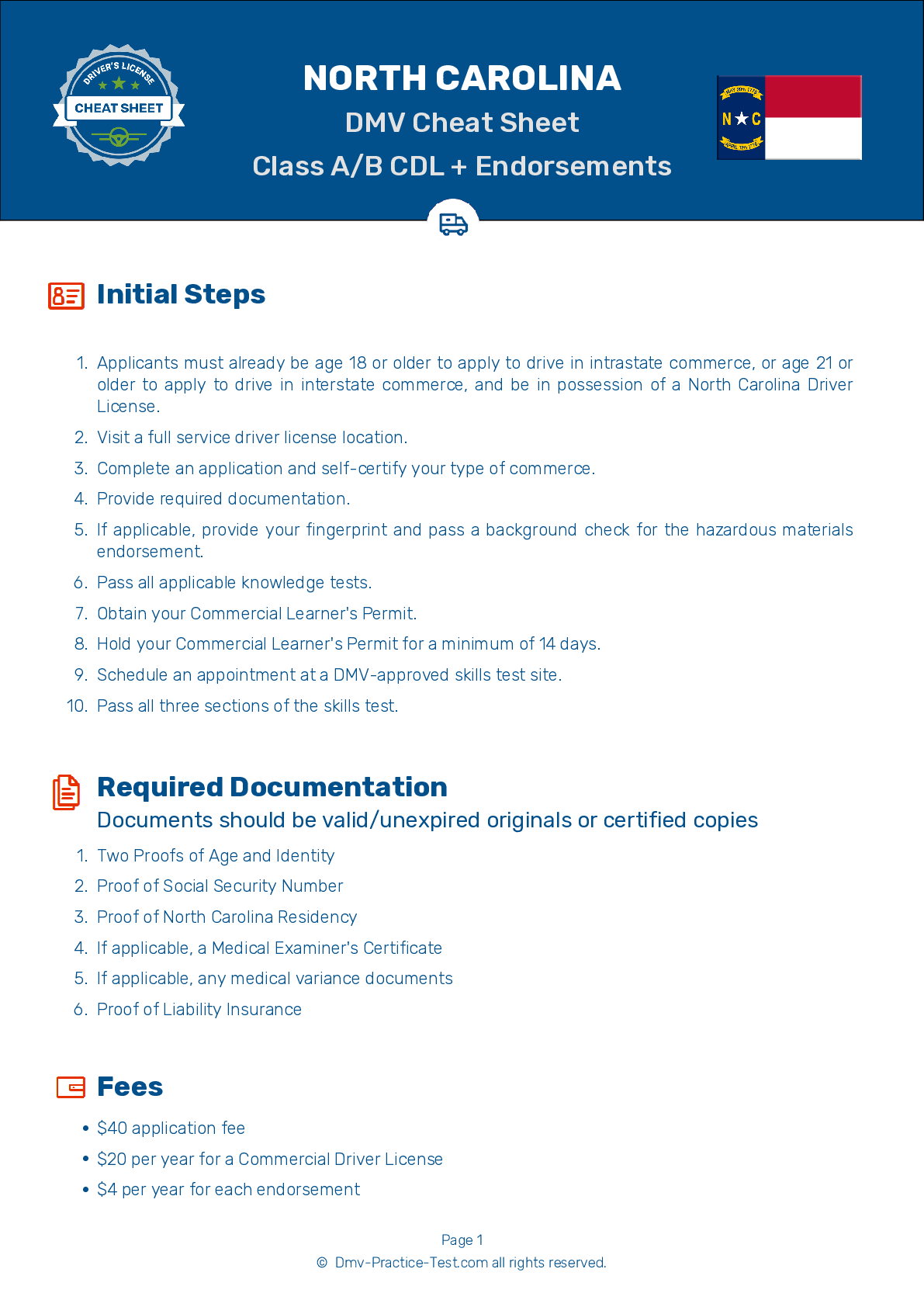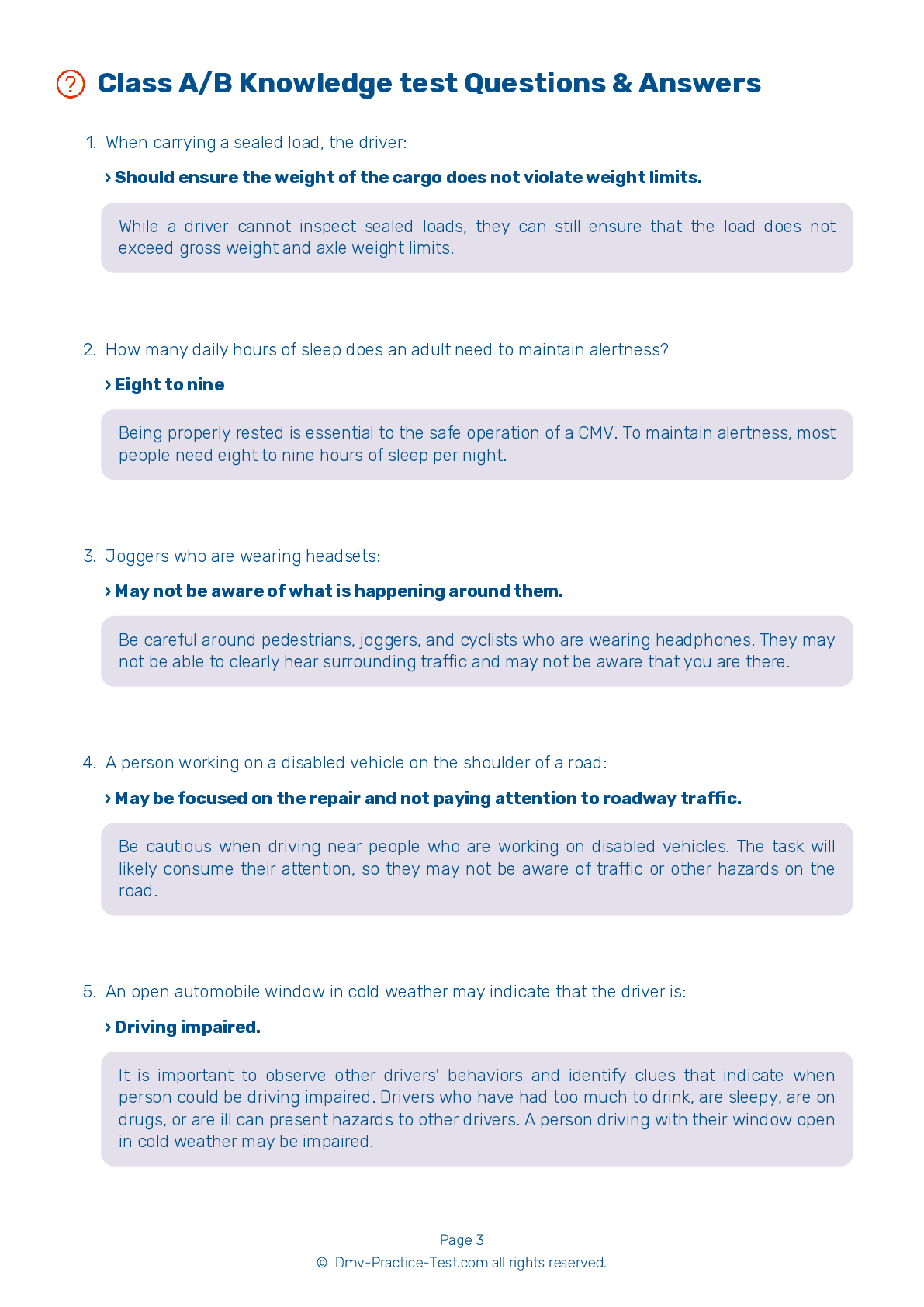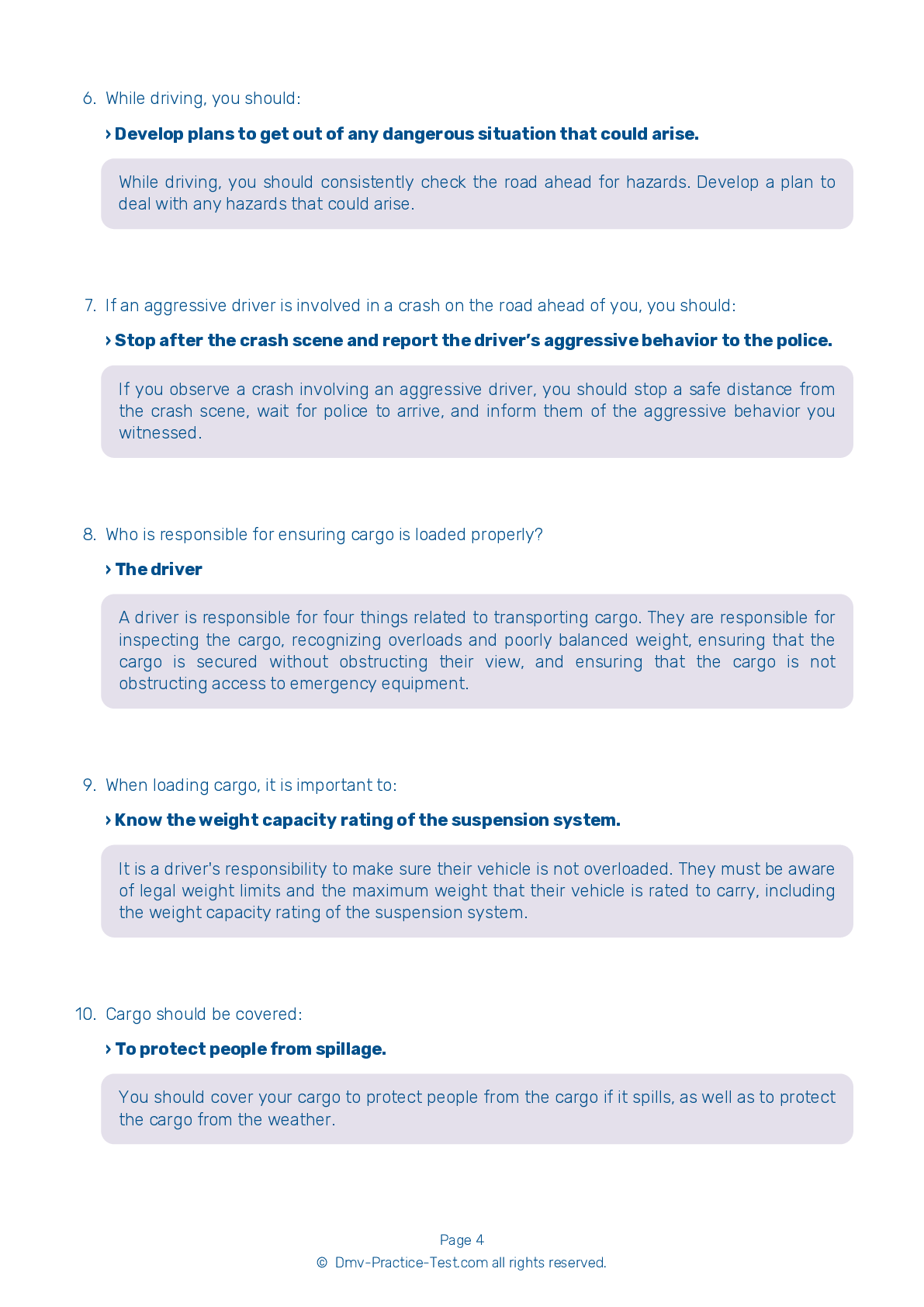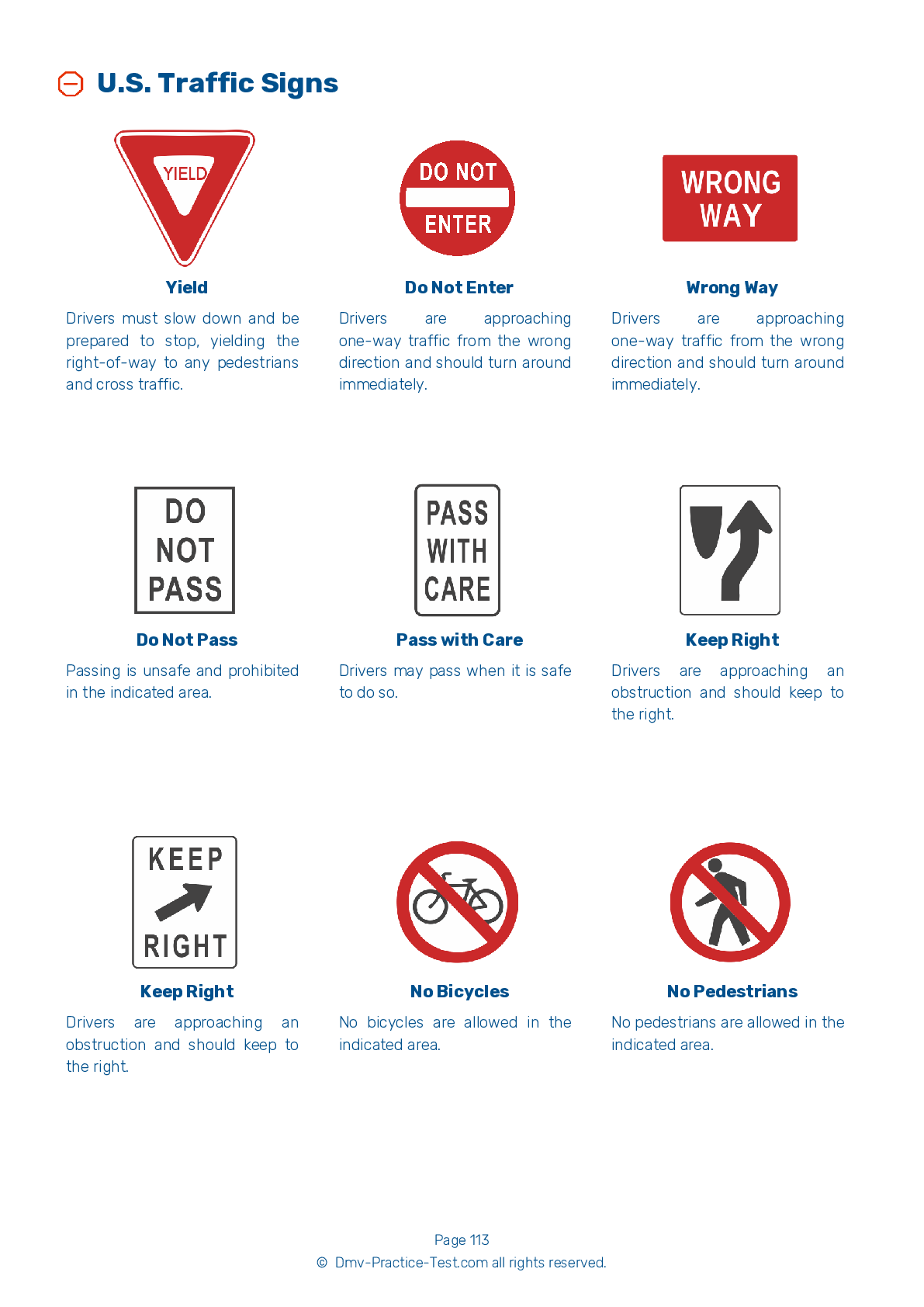HazMat #2
Hazmat Test | North Carolina 2026 #2 Page 2 of 5
On our website, we provide FREE practice - CDL hazmat test online! The official exam test consists of several obligatory parts, with all of them checking your knowledge of different blocks of road rules. If you need to obtain a NC CDL hazmat endorsement in 2026, practice as much as possible. Free sample tests published on our website will help you check and improve your knowledge and boost your grades. Please bear in mind that North Carolina requirements for issuing a hazmat endorsement for CDL may vary from those established in other states.
30
24
20
7 . What should a carrier do if hazardous materials are not properly prepared?
Refuse the shipment
It is the responsibility of a carrier to refuse improper shipments of hazardous materials.
8 . Class 1, Class 2.1, and Class 3 materials should not be placed in a trailer with:
The use of cargo heaters is not always permitted. When transporting materials that are categorized as Class 1 (Explosives), Class 2.1 (Flammable Gases), or Class 3 (Flammable Liquids), the use of heaters in the same space is generally prohibited.
9 . During a cargo fire, opening the trailer doors may actually cause the fire to expand because doing so:
When experiencing a cargo fire, it may be a bad idea to open the doors to the trailer. Doing so allows oxygen to enter the area, potentially causing the fire to flare up and expand.
10 . If a shipping paper describes both hazardous and non-hazardous materials, the hazardous materials may need to be:
If a shipping paper describes both hazardous and non-hazardous materials, the hazardous materials must be distinguished in one of three ways. They must be entered first on the shipping paper, highlighted in a contrasting color, or properly marked with an "X" in a column titled "HM."
11 . A Class 7 hazardous material is:
Corrosive.
Radioactive materials are categorized as Class 7 hazardous materials.
12 . When traveling with Division 1.1, 1.2, or 1.3 explosives, the vehicle should not be:
Parked on grass.
Except when parking briefly to perform necessary functions for vehicle operation (such as refueling), never park a vehicle carrying Division 1.1, 1.2, or 1.3 explosives within 300 feet of a bridge, tunnel, or building. Never park such a vehicle within five feet of the traveled portion of a road. Such vehicles should be parked only briefly.
2026 North Carolina | Frequently Asked Questions
A CDL Class A license in North Carolina allows the holder to operate any combination of vehicles with a Gross Combination Weight Rating (GCWR) of 26,001 or more pounds, given the Gross Vehicle Weight Rating (GVWR) of the vehicle(s) being towed is over 10,000 pounds. This category typically includes tractor-trailers and truck and trailer combinations.
A Class A CDL (Commercial Driver's License) in North Carolina allows the holder to operate any combination of vehicles with a Gross Vehicle Weight Rating (GVWR) of 26,001 pounds or more, provided the GVWR of the vehicle(s) being towed exceeds 10,000 pounds. This typically includes tractor-trailers, truck and trailer combinations, tank vehicles, and livestock carriers.
To obtain a Class A CDL in North Carolina, you must be at least 18 years old (21 for interstate driving), have a valid North Carolina driver's license, pass a vision test, and obtain a commercial learner's permit by passing written knowledge tests. You'll also need to pass a skills test which includes a pre-trip vehicle inspection, a basic controls test, and a road test.
In North Carolina, you must be at least 18 years old to qualify for a Class A CDL license for intrastate driving (within the state). However, you need to be at least 21 years old if you plan to drive commercially across state lines (interstate driving) or carry hazardous materials.
Specific endorsements aren't required for a Class A CDL license, but they can provide additional driving privileges. For example, endorsements are available for double/triple trailers, tanker vehicles, passenger vehicles, and hazardous materials. Each endorsement requires passing a separate knowledge test and, in some cases, a skills test.
The Class A CDL skills test in North Carolina encompasses three main components: a pre-trip vehicle inspection to assess your ability to determine whether your vehicle is safe for the road, a basic controls test to evaluate your basic maneuvering skills, and a road test to validate your on-road driving ability, including left and right turns, intersections, railway crossings, and various types of roadways.
Yes, Class A CDL license holders in North Carolina may face limitations. These can include restrictions based on medical conditions, such as hearing or vision impairments, or restrictions to operating only automatic transmission vehicles. Additionally, drivers under the age of 21 are restricted to intrastate driving (within North Carolina) only.
In North Carolina, the written Class A CDL test is primarily administered in English, following federal regulations. However, accommodations may be made for applicants with limited English proficiency. It's recommended to contact the North Carolina Division of Motor Vehicles directly to inquire about any available language assistance or resources.
Yes, you can request accommodations for the Class A CDL written test in North Carolina if you have a disability. The North Carolina DMV complies with the Americans with Disabilities Act and offers reasonable accommodations to help individuals with disabilities. You should contact your local DMV office in advance to discuss your needs and arrange appropriate accommodations.
Yes, you can retake the Class A CDL written test in North Carolina if you fail on your first attempt. However, you must wait at least one day before attempting the test again. If you fail three times, you'll need to wait at least 60 days before retesting. Remember, each attempt may require a new testing fee.



